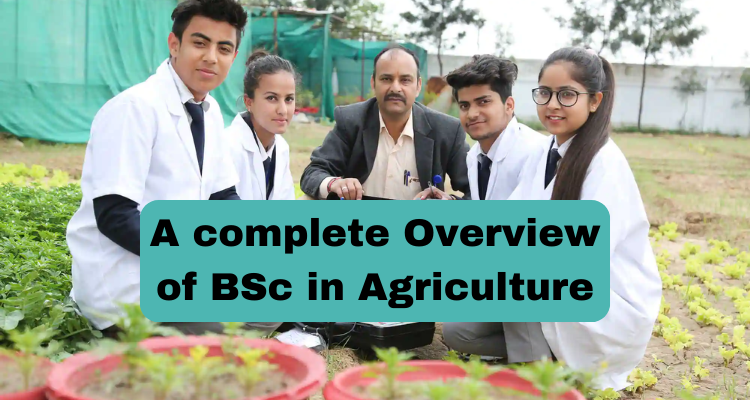Introduction of BSc in Agriculture:
The pursuit of a BSc in Agriculture opens doors to a world where innovation meets tradition, and sustainability intertwines with productivity. This multidisciplinary course equips students with a profound understanding of agricultural sciences, preparing them for dynamic roles in the ever-evolving agricultural landscape.
Understanding the Essence of BSc in Agriculture
At its core, BSc in Agriculture is a multidisciplinary program designed to provide students with a comprehensive understanding of agricultural sciences. This encompassing curriculum includes subjects such as Crop Science, Soil Science, Agronomy, Animal Husbandry, Horticulture, Agricultural Engineering, Agricultural Economics, and more. The goal is to produce graduates who not only comprehend the intricacies of farming but also possess the acumen to navigate the ever-evolving agricultural sector.
BSc in Agriculture: A Holistic Approach
The BSc in Agriculture course is structured to provide students with a holistic perspective on agriculture. Key components include Crop Science, Soil Science, Agronomy, Animal Husbandry, Horticulture, Agricultural Engineering, Agricultural Economics, and more. This comprehensive curriculum ensures that students gain proficiency in diverse facets of agriculture, from cultivating crops and managing soil health to understanding the economic aspects of the agricultural industry.
Exploring Core Subjects in BSc Agriculture
Crop Science: BSc in Agriculture delves into the science of crop cultivation, covering aspects such as plant physiology, breeding, and sustainable farming practices.
Soil Science: Understanding soil composition, fertility, and management is crucial in ensuring sustainable and productive agriculture. BSc Agriculture emphasizes soil science for well-rounded knowledge.
Agronomy: This subject focuses on the principles and practices of crop production, covering topics like crop management, weed science, and pest control.
Animal Husbandry: BSc Agriculture includes the study of livestock management, covering areas such as animal nutrition, breeding, and health care.
Horticulture: The cultivation of fruits, vegetables, and ornamental plants is explored in-depth, providing students with insights into sustainable horticultural practices.
Agricultural Engineering: From machinery and equipment to irrigation systems, BSc Agriculture introduces students to the technological aspects of modern farming.
Agricultural Economics: Understanding economic principles as applied to agriculture, including farm management, marketing, and policy, is an integral part of the curriculum.
Practical Learning and Industry Exposure
One of the strengths of the BSc in Agriculture course lies in its emphasis on practical learning. Students engage in hands-on experiences, fieldwork, and internships to apply theoretical knowledge to real-world agricultural scenarios. This practical exposure, coupled with industry visits and collaborations, ensures that graduates are well-prepared to address the challenges and opportunities in the agricultural sector.
Key Skills Developed Through BSc in Agriculture
Critical Thinking: BSc in Agriculture fosters critical thinking skills by encouraging students to analyze complex agricultural issues and develop innovative solutions.
Problem Solving: The course equips students with problem-solving skills essential for addressing challenges related to crop management, soil health, and sustainable agriculture.
Communication: Effective communication is emphasized, enabling graduates to convey their ideas, research findings, and agricultural recommendations clearly and persuasively.
Leadership and Management: BSc in Agriculture cultivates leadership and management skills, preparing graduates for supervisory roles and entrepreneurial ventures in the agricultural domain.
Future Prospects for BSc in Agriculture Graduates
As the global focus on sustainable agriculture intensifies, BSc Agriculture graduates are well-positioned for diverse career paths. Opportunities range from farm management, agricultural research, and agribusiness to roles in governmental and non-governmental organizations dedicated to agricultural development.
A BSc in Agriculture is not merely a degree but a gateway to a world where innovation meets tradition, and where graduates play a vital role in addressing the food and sustainability challenges of the future. The BSc Agriculture course, with its rich curriculum and practical orientation, prepares individuals to be the stewards of our agricultural future.







